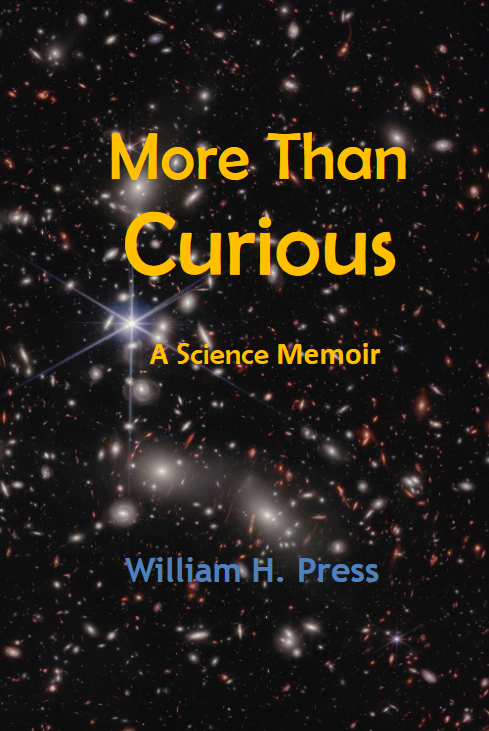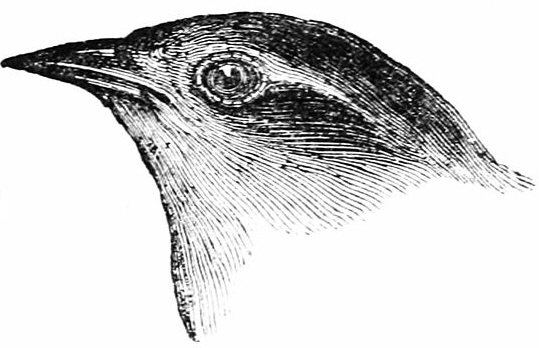
or here to download a PDF,
or here to download an EPUB file (Kindle compatible).
or listen to the audiobook (beta).
paperback or hardcover at BarnesAndNoble.com
More Than Curious: A Science Memoir
William H. PressAbout the Book
The author found himself in places and times to closely observe significant events and noteworthy personalities in 20th century science. Variously, he interacted with such notables as Richard Feynman, S. Chandrasekhar, Edward Teller, Ya. B. Zel'dovich, John Wheeler, James Watson, Julian Schwinger, Fred Hoyle, Martin Rees, Stephen Hawking, Freeman Dyson, Ed Witten, and many others. His Ph.D. advisor, Kip Thorne, and his Ph.D. student, Adam Riess, each won Nobel Prizes-for discoveries that he helped them start. Later, he worked with (or for) not just scientists, but also technology entrepreneurs and billionaires, admirals and generals, and political leaders including two U.S. presidents. His memoir is rich in stories about these people and events.
Early Praise for More Than Curious: A Science Memoir
"Press has written a riveting book, distinctive in style and theme. He is a top-rank scientist, having attained status and respect as a member of the U.S. academic elite. But unlike most such people, he finds 'ivory towers' constricting and has relished forays into the wider policy and political arena. He addresses important issues, and the narrative is laced and enlivened by intrigues and personality conflicts, recounted with unusual frankness. This enlightening and brilliantly-written book deserves wide readership."
"In More Than Curious, bear witness to the life and times one of the last of the Citizen Scientists. Bill Press is an astrophysicist like no other, who gifted his brilliance to the work of other scientists, and to multiple U.S. Presidents—through the Cold War and beyond. A natural storyteller, Press's crystalline and lucid accounts of people, places, and things, leave you feeling like a front-row witness to his extraordinary journey."
"This is a superbly interesting book, with personal insights, sometimes funny, often deep, into a half century of science and science's interplay with politics and public affairs. It has been shaped by the author's intense curiosity and creativity and his amazingly broad interests and expertise. Once I started reading, it was near impossible to put down."
"An epic tale of a scientific career told through unique behind-the-scenes portraits of the people, organizations and issues that defined late 20th century physics and things to which it led."
"As a memoir, More Than Curious is a picaresque exploration of high-level bureaucratic and academic politics. Pick it up anywhere, and within ten pages you'll find a sharp (sometimes snarky) insight into some event or public figure that Bill encountered in a long and productive career."
"This book is a gift: William H. Press places his scientific work in the context of the human stories and social and political institutions that swirled around him. He has the temperament, patience, and writing skills to do this with elegance and closely-observed detail. This deeply felt memoir is also an ethnography and history of science in our lifetimes: a rare look not only at a scientific sensibility at work, but of how the scientific establishment relates to the world of politics, economics, and corporate power. I loved it."
"Press began his scientific career at a time of dazzling new discoveries in astrophysics and was a pioneer in the study of black holes and gravitational wave detectors. In this well written and vivid memoir, he gives first-hand accounts of hobnobbing with such scientific luminaries as Richard Feynman, Edward Teller, and Kip Thorne, as well as with political leaders including Jimmy Carter and Barack Obama. Throughout, Press conveys the thrill of science and the obligations of its practitioners."
"Press shows himself a perceptive raconteur. His engaging vignettes create a fifty-year mosaic of physics, physicists, scientific institutions, and science policy."
"Ranging across astrophysics, computer science, cybersecurity, and computational biology, this thoroughly engaging memoir illuminates the operations of academic science and science organizations in the United States over the past five decades. Seasoned with self-deprecating wit, Press's book traces his career and wide interests and offers unvarnished accounts of political and psychological dimensions behind hiring and promotion decisions, science processes, and the impact of bureaucracies and individual leaders on university-based science, national defense research, and science policy development."
"Press's awe-inspiring intellect and Renaissance-era polymathy have spawned contributions in so many areas that I've found myself asking Google whether this can really be the same William H. Press. His book on numerical analysis and algorithms is the most dog-eared volume on my bookshelf; this latest one, by the same William H. Press, is yet another wonderful surprise, and I suspect that it too will get more than its share of wear and tear, both in my hands and in those of many others."
"Press represents the best of academic and public service excellence in America. His scientific expertise and contribution to the nation's security underwrite a remarkable life story. The lessons apply to all who aspire for meaning and consequence in their personal and professional lives."
"Press, one of the most consequential scientists of his generation, takes the reader on a tour of his life in science through seventy candid, vivid and highly-interesting vignettes. Press' world line spans research in astrophysics and computer science, academic administration and politics, nuclear weapons and science policy. You won't be able to put it down."
